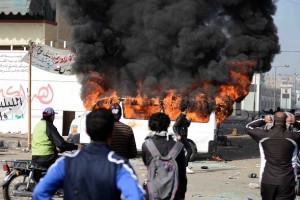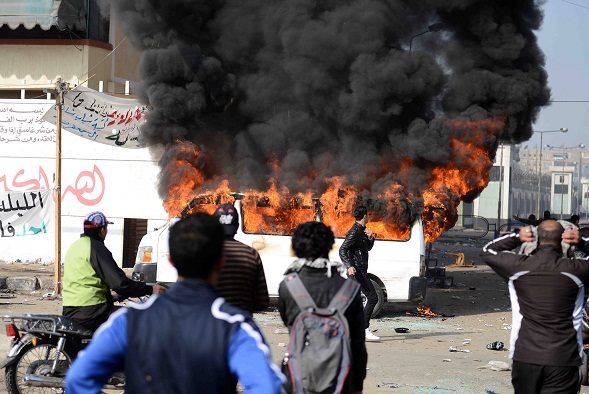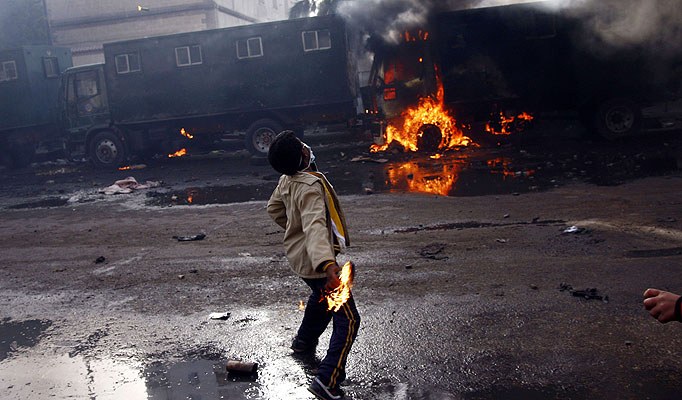
Clashes outside the Port Said prison stopped after the army surrounded the prison with 10 armoured vehicles and deployed a tank at the entrance on Saturday.
Violence erupted in Port Said Saturday morning after the Port Said Criminal Court sentenced 21 to death for their responsibility in the death of 74 football fans in a football match in February 2012 between Al-Ahly and Al-Masry club.
At least 72 defendants were on trial. Six of the sentenced 21 remain at large, according to the ONA news agency. The remaining defendants will be sentenced on 9 March.
Relatives of the convicted attacked the prison following the verdict in an attempt to free them, leading to clashes with prison security and the death of two policemen, Captain Ahmed Al-Balky and Officer Ayman Abdel Azim. A number of security personnel were also injured.
The city then descended into violence as protesters also broke into a police station east of the city and surrounded the Al-Arab police station.
They also set fire to the residence of police forces by the Amiri Hospital.
The Ministry of Interior issued statements saying they were under attack in Port Said and that Ultras Al-Masry, fans of Al-Masry football club, were trying to storm the governorate building.
Tear gas was used to disperse the protesters while a group of them reportedly headed to the court.
Live ammunition and automatic rifles were used by people in plainclothes, according to Rawya Rageh, a reporter for Al-Jazeera English in Port Said.
She added that the Port Said governor had requested a curfew that was reportedly implemented in the area around the prison.
The army implemented a security plan for vital installations in Port Said, as well as the Suez Canal. Entrances to the city have been sealed and all trains to Port Said have been stopped.
Protesters tried to stop tanks from entering the city, but the army was able to restore relative calm.
According to a statement made by Helmy Al-Afany, director of health affairs directorate in Port Said, hospitals suffered a shortage of blood and medical equipment as more than 200 injured were admitted.
Relatives of the convicted attacked the emergency garage of the governorate and tried to seize tractors and loaders to use them to break into the prison.
Ferries between Port Said and Port Fouad had also stopped while protestors blocked highways.
First Deputy of the Ministry of Electricity Aktham Aboul Ela called on people in Port Said to protect power facilities responsible for providing electricity to hospitals.
“It’s sad and devastating,” said media spokesperson for the Popular Current Heba Yassin.
“There were threats of violent escalations and the security should have taken precautions,” Yassin added.
She said that the Current rejected all violence against civilians or police as “they are all Egyptians and humans.”
Ahmed Mawlana, spokesperson of Al-Shaab Party of the Salafi Front disagreed with Yassin.
“The verdict was just and suitable to the crime committed, but relatives of the condemned trying to storm the prison to free them. This is a blatant violation of state authority,” Mawlana said.
The spokesperson of the main opposition coalition the National Salvation Front (NSF), Khaled Dawoud, said the front had no comment on the verdict.
He addressed the people of Port Said saying: “This is a first ruling, there’s room for appeal; killing more people will not help your case.”
The NSF threatened to boycott upcoming parliamentary elections if President Mohamed Morsy didn’t find a “comprehensive solution” to unrest in the country, reported AFP.
They called for forming a national salvation government to handle the crisis.
President Morsy addressed the nation at 1.30 am on Saturday via his official Twitter account. His decision to address the people came as a response to the violence that broke out in different governorates and led to eight deaths and hundreds of injuries.
Morsy offered his condolences to the families of protesters and policemen and promised “to pursue thugs and bring them to justice.”
He promised protection of peaceful protests and called on Egyptians to reject violence and uphold the noble principles of the revolution.
“Of [Morsy’s] people; 40% live in poverty and 60% have no computers or internet. Him using Twitter to respond shows how little he knows about this country,” Yassin said.
She added that the president’s tweet came very late, “eight people were dead by the time he responded and tweeting is not a way of offering condolences.”
Khaled Dawoud agreed: “It’s a shameful way to respond to a disaster.”
He added that it was offensive to the dead and showed how inefficient the president and the government were.




